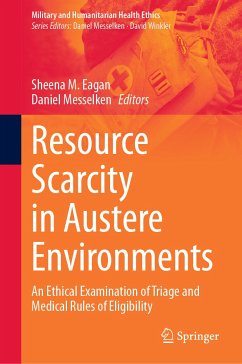This book focuses on resource allocation in military and humanitarian medicine during times of scarcity and austerity. It is in these times that health systems bend, break, and even collapse and where resource allocation becomes a paramount concern and directly impacts clinical decision-making. Such times are challenging and this book covers this very important, yet, scarcely researched topic within the field of bioethics. This work brings together experts and practitioners in the fields of military health care, philosophy, ethics, and other disciplines to provide analysis on a variety of related topics ranging from case studies and first-hand experiences to policy and philosophical analysis. It is of great interest to to academics, practitioners, policy makers and students who are looking for analyses and guidance regarding the fair provision of medical care and the use of medical rules of eligibility under adverse conditions.
Dieser Download kann aus rechtlichen Gründen nur mit Rechnungsadresse in A, B, BG, CY, CZ, D, DK, EW, E, FIN, F, GR, HR, H, IRL, I, LT, L, LR, M, NL, PL, P, R, S, SLO, SK ausgeliefert werden.









